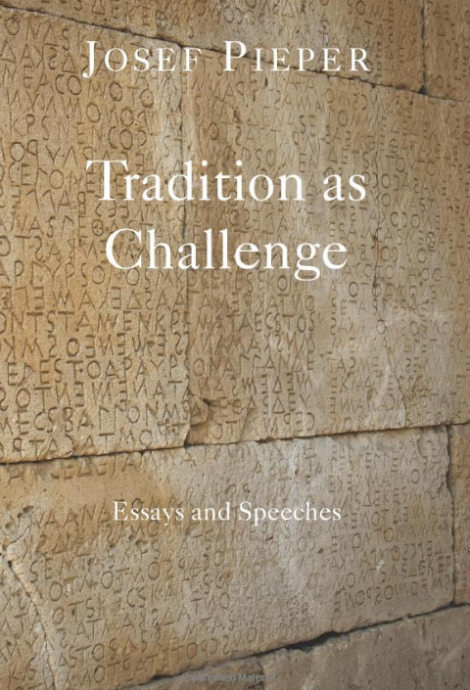How Tradition Renews Civilization and Challenges Conservatives
In our post-Enlightenment world, the word “tradition” often carries negative connotations. When coupled with adjectives like “regressive” and portrayed as that which impedes whatever has acquired the label of progress, the idea of tradition conveys a sense of being antithetical to humans’ wellbeing. Hence we encounter phrases like, “She’s rigid and traditional.”
A rather different and more creative understanding of tradition is found in the writings of the German philosopher Josef Pieper (1904-1997). Perhaps most famous for his book Leisure as the Basis of Culture (1948), Pieper spent his life engaged not only in lecturing at the University of Münster, but also educating teachers in teacher-training colleges. This was not—and is not—common in German academic culture.
This much-translated writer knew, however, that not all wisdom was to be found in contemporary universities. As he said in a 1958 address to graduating teachers: “The fruit of education is that the person knows how things really are in the world as a whole.” (Emphasis in original.) The fullness of reality, Pieper believed, went far beyond the horizons decreed by the modern university. Knowing this, however, required humility—the same humility that leads people to sit at the feet of great minds from the past so that they, too, can become wise.
Pieper’s conception of tradition is the focus of 25 essays and speeches published in 2015 under the title, Tradition as Challenge. From the first page, it is clear that he did not see tradition as an alternative political agenda to, say, liberalism or modern socialism. For him tradition did not entail rejecting technological development, or even promoting particular programs such as distributist economics. Indeed, Pieper avoided sponsoring anything resembling policies let alone political manifestos. His interest was in correctly understanding the tradition that underlies what he conceived of as Western civilization, and understanding how we restate particular moral and philosophical commitments embodied in this tradition amidst changing conditions.
The essays and speeches in this collection address topics ranging from the nature of hope to the poems of Boethius. A common theme of these pieces is the need to clarify the nature of tradition and how to transmit it through time. Here Pieper emphasizes the difference between the “periphery and kernel.” This, he says, “is the vital distinction upon which everything depends.”
Based on that difference, one will be able to discern, on the one hand, those who regard everything associated with a tradition as requiring almost static preservation and, on the other, those concerned about the core goods that must be conveyed and explained in ways that do not exactly replicate past articulations. Pieper is clearly in the latter camp. This may explain why he stresses that the right approach to tradition is not conservatism per se. As he puts it:
Tradition, as the living process of handing on, is a highly dynamic thing, so that real consciousness of tradition has only little to do with “conservatism.” There is no doubt that there are forms of conservatism which, on the contrary, actually hinder tradition—because they cling to the chance external form in which the tradendum appears in history, whereas it can only, if at all, be passed on to the future, under new external forms.
What must be resisted are efforts to obliterate or relativize the kernel, which for Pieper is more or less the Christian West. The words “Christian” and “West” mean much more for him than the geographical space of Western Europe. For one thing, “West” is that which is distinct from the dominant cultures of the Middle East. But above all, Pieper regards the “Christian West” as a distinct set of philosophical and religious commitments. Core to this tradition, he argues, is that which is sacred because it takes “its origins from a ‘Divine’ utterance.” Thus the “Christian West” concerns Revelation, of which, he specifies, the Hebrew Scriptures are a central part. There is no Christian West, Pieper emphasizes, without the Jewish canon.
At the same time, the kernel also contains what is frequently described as “the wisdom of the ancients.” On one level, this wisdom, found in the Platonic dialogues, for example, consists in the Greek emphasis on rationality. But, Pieper observes, the very same wisdom was understood by Plato as “knowledge which has come down from a supra-human source, a theios logos, a divine saying.”
This, some readers will recognize, closely resembles the argument made by that prominent admirer of Pieper, Joseph Ratzinger, in his famous Regensburg address of 2006 as Pope Benedict XVI, subsequently expanded upon in the Pope’s 2008 address to French intellectuals, before being cashed out in terms of the abiding relevance of natural law in his 2010 speech to the German Bundestag. Like Pieper’s understanding of tradition, Benedict XVI’s commentaries about these matters are not adequately described as “conservative.” What matters for Pieper and for Ratzinger is clarity in people’s minds that there is no necessary conflict between reason and revelation, and that separating the two cannot help but sow confusion in the West’s self-understanding.
Acknowledging the compatibility of reason and revelation is not “conservative”; nor is it, for that matter, “liberal” or “Progressive.” Pieper’s point is that splitting reason from revelation (or vice versa) is the antithesis of what it means to be Western. This is why, to Pieper’s mind, Islam can only be foreign to the West’s unique synthesis of faith and reason. The politically incorrect character of this argument does not detract from its saliency. In a 1957 article, Pieper even said that modern Turkey’s secularization was essentially “artificial” precisely because that country’s religious-philosophical design could never really accommodate such a development in a manner similar to that of the Christian West. At a distance of 60 years, that argument seems even more on point than ever.
It is not, however, Islam which is Pieper’s primary antagonist as he seeks to clarify tradition’s nature and meaning. Rather, it is the modern project. By this, he does not have in mind the advent of more efficient ways of undertaking particular activities or an emphasis on the natural sciences. In themselves, these are seen as potentially fruitful endeavors whose roots may be found in the Judeo-Christian and Greco-Roman commitment to knowing the truth. Pieper’s target is the type of outlook that promotes activity for the sake of activity: the sense that what matters is that you must be doing something and that it matters little what you are doing or even why—so long as you are changing the status quo. .
This is a perspective that Pieper associates with Friedrich Nietzsche. To this end, he cites Nietzsche’s diagnosis of the contemporary cultural situation: “What is most under attack today is the instinct and will for tradition; all institutions which owe their origin to this instinct are in confrontation with the taste of the modern mind.” For the Nietzsches of this world, says Pieper, the wisdom of the ancients is wrapped in “big words”—but words that are “only words” rather than sacred and thus unable to elicit reverence from anyone. The words thus need to be torn down.
It is through answering this challenge that we learn to distinguish true tradition, as Pieper understands it, from what he calls “the timid rigidity of the mere forms of conservatism.” Certainly, tradition implies preservation. But tradition acquires life, Pieper holds, when
it deals primarily not with conserving but much more with enlivening, imposing a new shape, finding a new formulation—something which cannot be achieved without direct involvement in the current problems of the age.
Though these essays and speeches were written decades ago, it is hard not to see their relevance to the question of how those who today understand themselves as conservatives or traditionalists interact with modernity. For Pieper, it is not through withdrawal from the modern world that tradition re-acquires its transformative powers. Tradition and its adherents, Pieper believes, must proactively engage the world and culture in which they live, move, and have their being.
Such an approach, Pieper says, will make it harder to dismiss as “historically interesting” but “outdated” the promoters of tradition and what it has to say. Moreover, actively underscoring the kernel of tradition that makes the West comprehensible to itself is, from Pieper’s standpoint, one way of ensuring that those who would eradicate the kernel from society’s consciousness will find it much harder to do so. This type of critical engagement also allows those who grasp tradition’s significance to winnow out what is peripheral, if not an actual hindrance to gaining a deeper comprehension of the central truths conveyed by the tradition.
The difficulty is knowing precisely when someone’s effort to engage with modernity has moved beyond dispensing with the periphery and inadvertently ended up putting the kernel itself in danger. This is further complicated by the fact that the kernel is often deeply imbedded in particular customs, habits, and attitudes that might be easily mistaken as peripheral.
In these essays, Pieper appears not to offer a hermeneutical key for making the vital distinction between what is the kernel and what is peripheral. He does, however, suggest that plain writing and speaking help to separate the wheat from the chaff. “It is,” he argues, “precisely in plainness of speech that selfless, free engagement with reality naturally comes to fruition and manifests itself.”
The same “plainness,” as Pieper calls it, is essential for revealing the sophistry that often undermines the goods which he regards as being at the heart of the Western tradition. Pieper freely acknowledges that “there can be extremely difficult statements which are comprehensible only to the few experts.” Yet this, he maintains, is different from what he calls “certain forms of ‘scientific’ language which hardly have any connection with the everyday language we normally speak.”
One contemporary field where this problem abounds is modern bioethics. Bioethicists often employ complicated terminology to disguise the fact that what they are really doing is legitimizing efforts to manipulate and terminate human life to benefit others.
Another example might be John Rawls’s A Theory of Justice (1971). The book’s torturous prose lays out an agenda of egalitarianism via a state whose core purpose is in fact not justice but endless redistribution for the sake of an unrealizable equality of condition.
Yet another might be the type of economics that has dominated mainstream economics journals since the discipline’s mathematization following the publication of Paul Samuelson’s Foundations of Economic Analysis (1947). Rare were the market economists such as Wilhelm Röpke (cited favorably in a Pieper essay not in this collection, “The Art of Not Yielding to Despair”), who were willing to say that this trend had contributed to the gradual separation of much economic science from basic truths about the nature of human choice and action.
In this sense, Pieper’s reflections continue to be an important resource for those who regard tradition as that which, over time, holds together different insights into the truth of things. Tradition, in Pieper’s understanding, provides us with a powerful light that can expose those ideas that, in the name of progress, actually facilitate profound regression.
This, I’d suggest, reminds us of how much we rely on tradition to ensure that civilization endures.



